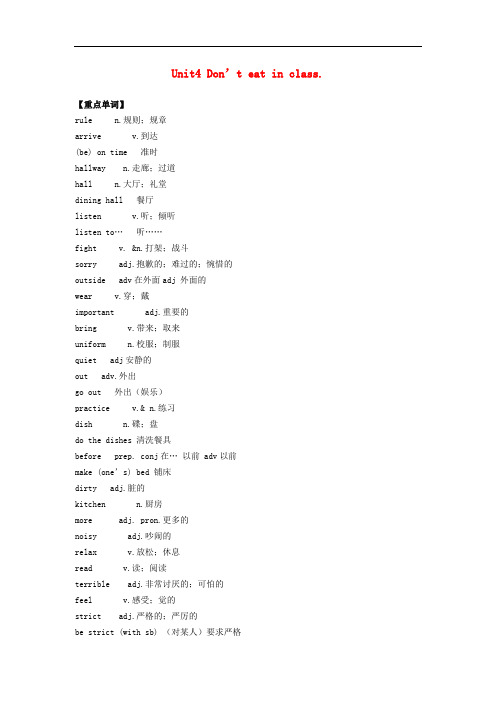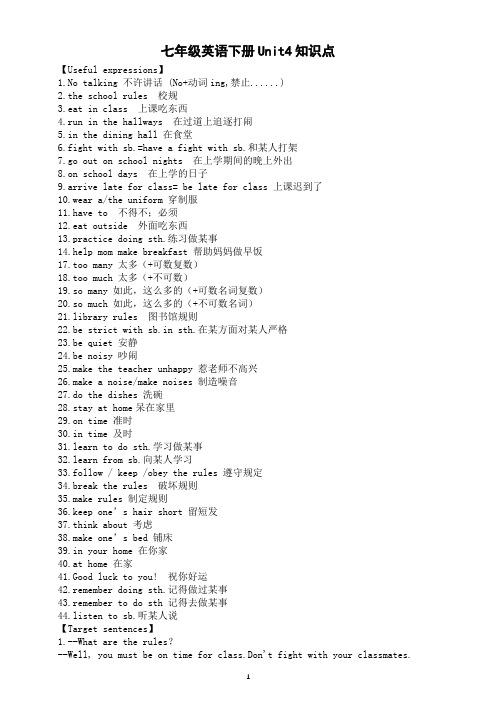初中英语人教版七年级下册Don’t eat in class.
- 格式:ppt
- 大小:90.00 KB
- 文档页数:6

Unit4 Don’t eat in class.【重点单词】rule n.规则;规章arrive v.到达(be) on time 准时hallway n.走廊;过道hall n.大厅;礼堂dining hall 餐厅listen v.听;倾听listen to…听……fight v. &n.打架;战斗sorry adj.抱歉的;难过的;惋惜的outside adv在外面adj 外面的wear v.穿;戴important adj.重要的bring v.带来;取来uniform n.校服;制服quiet adj安静的out adv.外出go out 外出(娱乐)practice v.& n.练习dish n.碟;盘do the dishes 清洗餐具before prep. conj在…以前 adv以前make (one’s) bed 铺床dirty adj.脏的kitchen n.厨房more adj. pron.更多的noisy adj.吵闹的relax v.放松;休息read v.读;阅读terrible adj.非常讨厌的;可怕的feel v.感受;觉的strict adj.严格的;严厉的be strict (with sb) (对某人)要求严格remember v.记住;记起follow v.遵循;跟随follow the rules 遵守规则luck n.幸运;运气keep v.保持;保留hair n.头发;毛发learn v. 学习;学会【重点短语】1. Don’t eat in class 在课堂上2. arrive late for class 上课迟到3. be on time 准时4.in the hallways 在走廊里5.in the dining hall 在餐厅6. listen to music 听音乐7 fight with…与某人打架8.Don’t eat in class. 不要在课堂上吃东西。

七年级英语下册Unit4知识点【Useful expressions】1.No talking 不许讲话 (No+动词ing,禁止......)2.the school rules 校规3.eat in class 上课吃东西4.run in the hallways 在过道上追逐打闹5.in the dining hall 在食堂6.fight with sb.=have a fight with sb.和某人打架7.go out on school nights 在上学期间的晚上外出8.on school days 在上学的日子9.arrive late for class= be late for class 上课迟到了10.wear a/the uniform 穿制服11.have to 不得不;必须12.eat outside 外面吃东西13.practice doing sth.练习做某事14.help mom make breakfast 帮助妈妈做早饭17.too many 太多(+可数复数)18.too much 太多(+不可数)19.so many 如此,这么多的(+可数名词复数)20.so much 如此,这么多的(+不可数名词)21.library rules 图书馆规则22.be strict with sb.in sth.在某方面对某人严格23.be quiet 安静24.be noisy 吵闹25.make the teacher unhappy 惹老师不高兴26.make a noise/make noises 制造噪音27.do the dishes 洗碗28.stay at home呆在家里29.on time 准时30.in time 及时31.learn to do sth.学习做某事32.learn from sb.向某人学习33.follow / keep /obey the rules 遵守规定34.break the rules 破坏规则35.make rules 制定规则36.keep one’s hair short 留短发37.think about 考虑38.make one’s bed 铺床39.in your home 在你家40.at home 在家41.Good luck to you! 祝你好运42.remember doing sth.记得做过某事43.remember to do sth 记得去做某事44.listen to sb.听某人说【Target sentences】1.--What are the rules?--Well, you must be on time for class.Don't fight with your classmates.2.We can’t listen to music in the classroom or hallways.3.--Can we bring music players to school?--Yes, we can./No, we can’t.4.And we always have to wear the school uniform.5.--Does he have to wear a uniform at school?--Yes, he does./No, he doesn't.6.--What do you have to do?--We have to be quiet in the library.7.Don't leave the dirty dishes in the kitchen.8.My dad says I can’t play basketball after school because I must do my homework.9.After dinner, I can’t relax,either.I must read a book before I can watch TV.10.I know how you feel.11.There are a lot of things you can do.12.Parents and schools are sometimes strict but remember, they make rules to help us.13.I think it’s best to follow the rules.14.I can’t go out on school nights.15.I have to do my homework after school.16.I must practice the guitar before dinner.【Language points】1.Don’t arrive late for class.(1)arrive v.到达;是不及物动词,若接地点名词,要加介词in或at。


人教版初中英语七年级下册Unit4SectionA教材全解Unit 4 Don’t eat in class.Unit 4 Section A教材全解1.Don’t arrive late for class。
上课不要迟到.【重点注释】①这句是祈使句的否定形式(Don’t +行为动词原形+其他),用于表达命令、请求等。
祈使句可以表达说话人的意愿、请求、叮嘱、号召、命令或建议,它的主语(听话人)通常省略,谓语动词用原形,句子末尾用感叹号或句号.例如:Don’t throw the ball like that。
不要那样扔球.②arrive late for与be late for同义,都表示“做某事迟到”.arrive late for侧重到达的时间晚,be late for侧重状态。
例如:Don’t arrive late for the meeting next time.=Don’t be late for the meeting next time。
下次开会别迟到了.③arrive不及物动词,意为“到达,抵达,来到",不能直接跟名词作宾语,但可以接介词at或in,构成短语“arrive at/in+地点(at+小地方,arrive at the bus stop;in+大地方,arrive in Beijing)",意为“到达……”;arrive后若是here,there,home 等地点副词,则不需要加in或at等介词(arrive here/there/home)。
例如:He arrives at the bus stop at 8 o’clock every morning。
他每天早晨8点到达公共汽车站。
When did you arrive in Beijing?你什么时候到北京的?I arrive home at 4:00 in the afternoon。
我下午4点钟到家.【辨析记忆】arrive,reach与get①arrive和get都是不及物动词,前者较正式,后者则较口语化.两者之后均不可直接接宾语,但可直接接here,there,home之类的表地点的副词作状语。


Unit 4 Don't eat in class.知识点讲义2022-2023学年人教版英语七年级下册(含答案)2024年人教版初中英语七年级下册Unit 4知识点讲义(含巩固练习)Unit 4 Don’t eat in class.Section A1.Don’t eat in class. 意为:“不要在课上吃东西。
”该句为祈使句,表示一种命令、请求、禁止等语气。
其肯定结构常用动词原形开头,否定结构常用don’t开头。
Eg: Be quiet. “保持安静。
”2.in class “在课堂上”3.School rule “校规”Rule (名) “规矩、规则、控制”Rule (动) “统治、支配、用直尺画线”Make rules “制定规则”4.Don’t arrive late for class. “不要上课迟到。
”(1) Arrive用法见Unit 2 Section B第9点笔记(2)be late for... “迟到...”5.You must be on time. “你必须守时。
”(1)must为情态动词,表示“必须;务必”等意,有时还表示“一定”,起到加强语气的作用。
其没有人称时态的变化,后面加动词原形。
Eg: I must do my homework right now. “我必须立刻做作业。
”(2)on time “按时;准时” in time “及时”6.Don’t listen to music in class. “上课时不要听音乐。
”Listen to music “听音乐”7.Don’t fight. “不要打架。
”Fight with sb. “和某人打架”8.Wear a hat “戴帽子”Wear详解请参考Unit 2 Section A 第3点笔记9.Some of the rules “其中的一些规矩”10.Important (形容词) “重要的”其派生词为:importance (名词) “重要性”11.Bring (动) “带来”,从别处带到说话人处Take (动) “带去”从说话人处带到别处12.Have to “必须;不得不” 有被迫之意而must有主动之意13.School uniform “校服”14.I see. “我懂了;我明白了。
Unit 4 Don’t eat in class适用年级七年级所需时间课内共用4课时主题单元学习概述本主题单元的标题是“Don’teat in class.”,是人教版七年级下册第四单元,内容与学生学校生活相关,符合七年级学生的年龄特点和心理特点,他们有深刻的生活体验,易于接受。
本单元的中心话题是rules,主要语言功能项目是谈论并制定某些规章制度(校规、班规、家规等)。
语言结构为祈使句,情态动词can 表示许可的用法和情态动词must,have to以及各种句式的变化。
围绕这一中心话题,结合学生生活实际,教材插入了许多学生感兴趣的图片,从基本语言知识到语言综合运用层层递进,听、说、读、写依次展开,引导学生思考、学习和运用语言,并寓教于学,对学生起到规范教育作用。
谈论规章制度这个话题在英语中表现出较强的语体差异——书面语及口语、正式及非正式场合中语言的使用不完全相同。
具体说,书面语及命令式的正式口语中人们多使用祈使句,而大多数口语交流中,人们则有意回避祈使句结构,较多地使用相应的情态动词。
这一点,英语和汉语的语言文化有很大差异。
英语语言中,不合时宜或生硬地使用祈使句,即便不被视为没有礼貌或缺乏教养,也回被认为不够友善。
因此通过这单元的学习,学生还将学会如何得体地使用祈使句和情态动词来谈论规章制度。
本单元的学习重、难点:重点掌握祈使语气的用法,包括表示允许的Can及其当情态动词用的haveto do;以及各种可以用在表述规章制度的动词和句型。
难点在于情态动词的用法,以及祈使句与它的应答。
依据语言学习“感知、体会、理解、运用”的认知规律,将本单元的学习划分为两个专题。
专题一:学会得体地使用祈使句和情态动词来谈论学校规章制度。
专题二:如何运用所学与他人谈论其他规章制度,如家规,公共场合的规章制度等。
专题三是研究性学习专题,在以上两个专题学习的基础上,了解中外相同或不同的校规、班规及家规,了解西方孩子有烦恼时,更愿意向专业人士或机构求助。
初中英语人教版七年级下册Unit4 Dont eat in class----5fe14ae2-6eab-11ec-9482-7cb59b590d7d初中英语人教版七年级下册unit4donteatinclass第四单元上茶课。
B节(2a-2c)I.【教科书分析】的教学目标和知识目标1.学习并熟练掌握下列单词。
dirty,kitchen,more,noisy,relax,read,terrible,feel,strict,remember,follow,luck, bestrict(withsb),followtherules2.学习并掌握以下句型,并讨论家庭规则和学校规则。
(1)有很多规则。
(2)赶快起床,整理好你的床。
(3)不要把脏盘子留在厨房里。
(4)在我看电视之前,我先看电视。
(5)我在10点之前到达。
(6)…他们会帮助我们。
能力目标讨论家庭规则和学校规则。
情感目标学会自觉遵守家规和校规,和家人和谐相处,作一名合格的中学生。
谈论家庭规则教学难点1 can和must的用法。
2.haveto的用法。
教学方法情境教学法;任务型教学法。
2、 [教学过程]ⅰ.复习热身freetalk:谈论家规和校规。
例如:―whatareyourschoolrules?―wecan’tarrivelateforclass.wemustbeontime.―can youeatintheclassroom?―no,wecan’t.butwecaneatinthedininghall.―whataboutyourf amilyrules?―imustdomyhomeworkintheevening.―…ⅱ.感知体验1.教学本课新单词和句型:教师利用多媒体课件创设情境、出示图片等,呈现和学习新单词和新句型,谈论家庭规则。
重点单词和短语:dirty,kitchen,more,noisy,relax,read,terrible,feel,strict,remember,follow,lu ck,bestrict(withsb),followtherules重点句式:(1)therearetoomanyrules.(2)getupnowandmakeyourbed.(3)don’tleavethedirtydis hesinthekitchen.(4)imustreadabookbeforeicanwatchtv.(5)ihavetogotobedbefore10:00.(6)…theymakerulestohelpus.2.预读课文,回答下列问题:(1)aretheremanyrulesinmolly’shome?(2)whatdoesmollyhavetodoafter shehasbreakfas t?(3)whydoesmollyhavetoruntoschool?(4)放学后她能玩篮球吗?(5)他必须在10点之前到吗?ⅲ. 巩固2a:whenyouareunhappyaboutsomething,whodoyouliketotalkto?利用该问题导入课文学习。